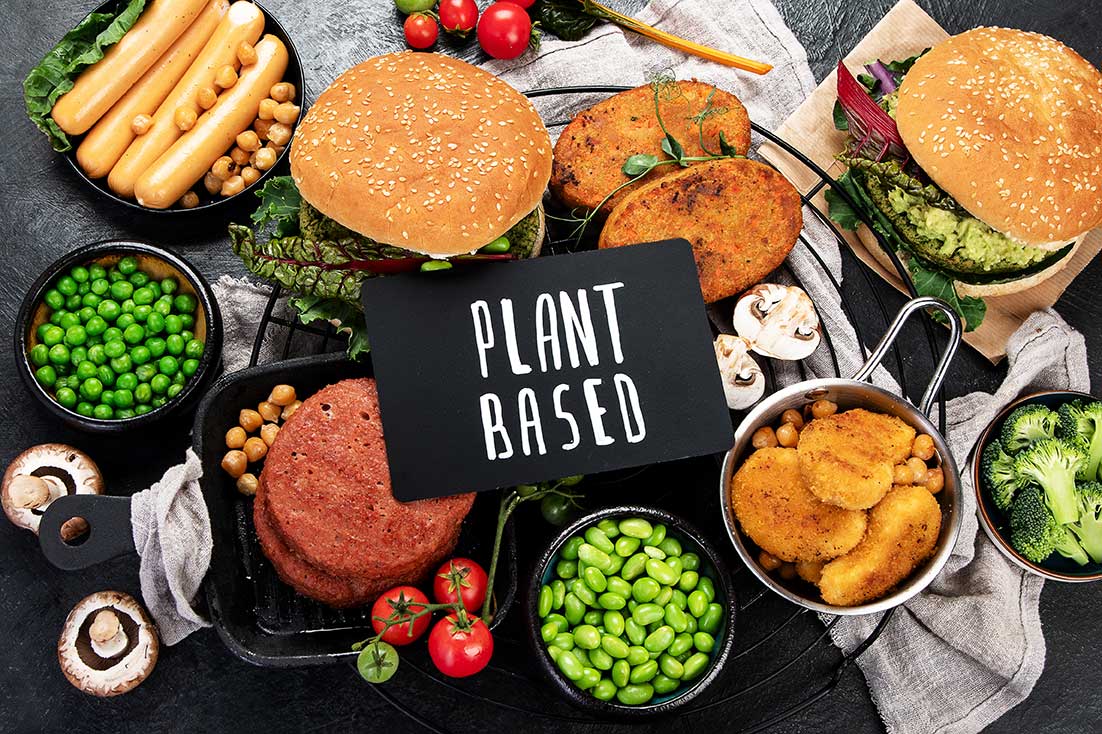5 Creative Plant Based Chicken Dishes That Go Beyond the Basics
5 Creative Plant Based Chicken Dishes That Go Beyond the Basics
Blog Article
Everything About Healthy Food: Benefits of Embracing Plant Based Choices
The discussion surrounding plant-based diets has gained considerable interest in current years. Numerous people are checking out the potential health advantages, nutritional benefits, and ecological effects related to these dietary selections. As people become extra knowledgeable about their food's impact on health and sustainability, concerns arise regarding the practicalities of adopting such a way of life. What specific changes can one anticipate, and how might these selections reshape not just individual health and wellness yet additionally the world's future?
Comprehending Plant-Based Diets
Although many individuals connect plant-based diet regimens mainly with vegetarianism or veganism, these diets can incorporate a variety of eating patterns that prioritize whole, minimally processed plant foods. Such diet plans typically consist of fruits, veggies, whole grains, legumes, seeds, and nuts, while removing or limiting pet products. This flexibility enables people to tailor their nutritional selections according to dietary demands and personal choices. Some might adopt a mostly plant-based diet regimen while still occasionally consuming meat or dairy products, often referred to as a flexitarian approach. The emphasis remains on incorporating even more plant foods, which can cause a varied range of meals and tastes. Recognizing these various interpretations of plant-based consuming is essential for valuing its accessibility and charm in modern food society.
Health And Wellness Perks of Plant-Based Foods
The health and wellness benefits of plant-based foods are considerable, supplying a nutrient thickness advantage that sustains total health. Study suggests that these foods can improve heart wellness and play an essential duty in reliable weight monitoring. By including more plant-based choices, individuals may enhance their dietary selections and advertise lasting health.
Nutrient Density Benefit
Nutrient density plays a necessary function in the health and wellness benefits of plant-based foods, making them an engaging option for those looking for a well balanced diet plan. Plant-based foods, such as fruits, veggies, legumes, nuts, and whole grains, are commonly rich in essential vitamins, minerals, and antioxidants while being reduced in calories. This high nutrient thickness allows individuals to eat fewer calories while still fulfilling their dietary requirements. Additionally, these foods are packed with nutritional fiber, promoting gastrointestinal health and wellness and helping in weight management. By integrating nutrient-dense plant-based choices, consumers can boost their overall health and wellness, support their body immune systems, and minimize the danger of persistent illness. Eventually, the nutrient thickness of plant-based foods emphasizes their relevance in a health-conscious way of living.
Heart Wellness Improvement

Weight Monitoring Support
In enhancement to promoting heart health, a plant-based diet can significantly help in weight monitoring. This nutritional method stresses entire foods such as fruits, vegetables, legumes, nuts, and entire grains, which are usually lower in calories and greater in fiber compared to animal-based products. The high fiber material aids raise satiety, minimizing general calorie consumption. Moreover, plant-based diet regimens are commonly abundant in vital nutrients while reduced in undesirable fats, making it much easier to preserve a healthy weight. Plant Based Beef. Study shows that individuals who take on a plant-based lifestyle often tend to have reduced body mass indexes (BMIs) and experience even more successful weight-loss contrasted to those that eat meat-heavy diet regimens. Subsequently, welcoming plant-based options is a tactical selection for effective weight monitoring
Nutritional Value of Plant-Based Ingredients
Plant-based components are rich in important nutrients, supplying a diverse range of vitamins, minerals, and anti-oxidants that contribute to total wellness. A contrast of protein resources discloses that while pet products are often considered as exceptional, lots of plant-based choices offer adequate healthy protein and various other valuable compounds. Recognizing the dietary value of these ingredients can aid individuals make notified nutritional choices.
Important Nutrients in Plants
Nutrient-rich components discovered in plants use a varied array of necessary vitamins and minerals that contribute greatly to overall wellness. These components are abundant in vitamins check my site A, C, and K, which support immune feature, vision, and blood clot, respectively. Additionally, plants provide essential minerals such as potassium, magnesium, and calcium, important for heart health, muscle feature, and bone toughness. The presence of fiber in plant-based foods aids food digestion and advertises a healthy and balanced intestine microbiome. Antioxidants, located perfectly in veggies and fruits, aid combat oxidative anxiety and lower inflammation. In addition, many plant foods are reduced in calories yet high in nutrients, making them an exceptional selection for those seeking to maintain a healthy and balanced weight while making sure optimal nutrient intake.
Comparing Healthy Protein Sources
Protein sources vary significantly in their dietary profiles, with plant-based ingredients providing unique advantages. Unlike pet proteins, which usually consist of saturated fats and cholesterol, plant healthy proteins tend to be reduced in these unhealthy elements. Legumes, nuts, seeds, and whole grains are abundant in vital amino acids, fiber, vitamins, and minerals. Lentils offer high protein content alongside substantial iron and folate, while quinoa is a total healthy protein, supplying all 9 crucial amino acids. Furthermore, plant-based healthy proteins are often accompanied by anti-oxidants and phytochemicals that support total health and wellness. The change to plant-based protein resources not only boosts nutritional consumption but additionally aligns with lasting dietary methods, reducing ecological effect and advertising long-lasting wellness benefits.
Ecological Impact of Plant-Based Eating
As recognition of environment change expands, numerous individuals are discovering sustainable nutritional selections that can considerably reduce their ecological impact. Plant-based eating has actually become a considerable factor to reducing greenhouse gas discharges, which are largely related to livestock manufacturing. The farming of fruits, veggies, beans, and grains generally calls for fewer resources, such as water and land, compared to pet farming. In addition, plant-based diets can lead to lowered deforestation, as less land is needed for grazing animals or expanding pet feed. By moving in the direction of plant-based options, consumers can support biodiversity and advertise healthier ecological communities. Overall, accepting plant-based consuming not just advantages individual health and wellness however additionally stands for an essential action towards ecological sustainability and preservation initiatives.
Overcoming Common Misconceptions
While lots of people acknowledge the benefits of a plant-based diet plan, several mistaken beliefs usually hinder them from totally welcoming this way of life. A common idea is that plant-based diets lack enough healthy protein; however, numerous plant sources, such as vegetables, nuts, and tofu, offer sufficient protein. Furthermore, some think that this diet regimen is expensive, when as a matter of fact, staples like beans, rice, and seasonal veggies can be quite budget-friendly. Another false impression is that plant-based consuming is excessively limiting, whereas it in fact provides a varied range of foods and flavors. Finally, numerous worry that a plant-based diet regimen might bring about shortages, yet with correct preparation, people can acquire all needed nutrients, including minerals and vitamins, while appreciating a variety of tasty dishes.
Tips for Transitioning to a Plant-Based Lifestyle
Making the change to a plant-based lifestyle can be an improving experience, though it typically calls for some advice to navigate the initial adjustments. Initially, people are motivated to start slowly, incorporating more fruits, veggies, legumes, and entire grains right into their dishes while lowering meat and dairy products intake. Dish planning is vital; preparing a weekly menu can aid reduce the modification and prevent last-minute undesirable selections. Discovering brand-new dishes and cooking methods can additionally maintain and enhance the experience enjoyment regarding plant-based consuming. Furthermore, joining support system or communities can give inspiration and share beneficial tips. Finally, remaining educated concerning nourishment assurances balanced dishes, preventing shortages while promoting a healthy and balanced, enjoyable plant-based way of life.
Delicious Plant-Based Meal Ideas
Checking out scrumptious plant-based dish concepts can inspire people to welcome an extra nutritious diet. One preferred alternative is a hearty quinoa salad, featuring cherry tomatoes, cucumber, and a zesty lemon-tahini clothing. Another fave is a tasty lentil stew, packed with carrots, celery, and fragrant herbs, excellent for a soothing supper. For breakfast, overnight oats made with almond milk, chia seeds, and covered with fresh berries provide a nourishing start to the day. In addition, a vibrant veggie stir-fry with tofu and a variety of vivid veggies can be a fast yet pleasing meal. Creamy avocado salute on whole-grain bread, sprayed with flavors and seeds, offers an easy yet delicious treat. These dishes showcase the variety and splendor of plant-based eating.

Regularly Asked Inquiries
Can a Plant-Based Diet Regimen Provide Sufficient Protein?
The concern read this post here of whether a plant-based diet can give enough healthy protein is usual. Numerous resources, including vegetables, nuts, seeds, and whole grains, can satisfy healthy protein requires successfully, supporting a nutritious and balanced diet regimen for people.
Are Plant-Based Diet Regimens Ideal for Children?
The viability of plant-based diets for kids depends upon mindful preparation. Ample nutrients must be assured, consisting of proteins, minerals, and vitamins. With proper assistance, such diet regimens can support healthy growth and growth in kids.
Just how Do I Eat in restaurants on a Plant-Based Diet?
Dining out on a plant-based diet regimen entails seeking restaurants with diverse food selections, requesting modifications, and exploring vegan-friendly choices. Preparation ahead and communicating nutritional preferences can improve the eating experience while preserving dietary choices.
What Are Typical Irritants in Plant-Based Foods?
Common irritants in plant-based foods consist of soy, gluten, nuts, and seeds - Gluten Free BBQ Sauce. Individuals adhering to a plant-based diet needs to recognize these allergens and check out tags carefully to prevent damaging responses and ensure secure usage
Can Plant-Based Diets Help With Fat Burning?
Research study shows that adopting a plant-based diet regimen may facilitate weight management because of its commonly lower calorie density and greater fiber web content. This combination can boost satiation, assisting people manage their caloric consumption efficiently. Lots of individuals connect plant-based diets primarily with vegetarianism or veganism, these diet regimens can include a vast range of eating patterns that focus on whole, minimally refined plant foods. Nutrient thickness plays a crucial function in the wellness advantages of plant-based you can try here foods, making them an engaging option for those seeking a balanced diet regimen. Plant-based diet plans have actually been revealed to noticeably improve heart wellness, as they frequently include components that sustain cardio feature. In enhancement to promoting heart health and wellness, a plant-based diet plan can considerably aid in weight monitoring. An usual belief is that plant-based diet plans lack adequate healthy protein; nevertheless, various plant sources, such as beans, nuts, and tofu, give ample protein.
Report this page